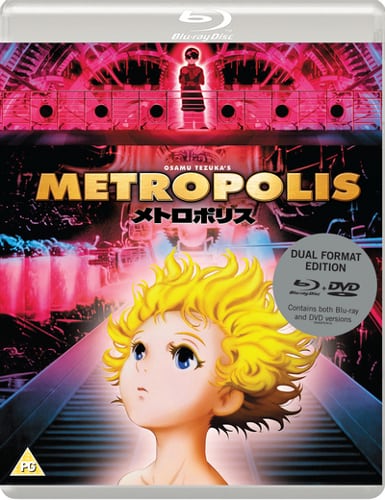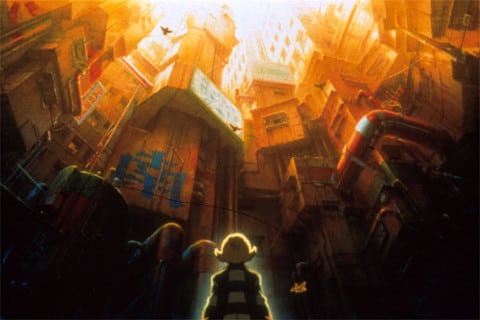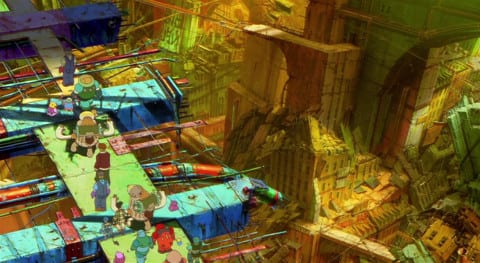Metropolis (2001)
Directed by: Rintaro
Written by: Katsuhiro Ôtomo, Osamu Tezuka
Starring: Kei Kobayashi, Kôki Okada, Tarô Ishida, Yuka Imoto
AKA METOROPORISU
Japan
AVAILABLE ON DUAL FORMAT STEELBOOK 16th January, DUAL FORMAT 13th March, from EUREKA ENTERTAINMENT
RUNNING TIME: 110 min
REVIEWED BY: Dr Lenera, Official HCF Critic
In the futuristic city of Metropolis, robots are discriminated against and segregated to the city’s lower levels. Many humans are deprived and blame robots for taking their jobs. Duke Red wants to rule the city and his first step is to oversee the construction of a massive skyscraper called the Ziggurat. Private detective Shunsaku Ban and his nephew Kenichi travel to Metropolis to arrest Dr. Laughton, a mad scientist wanted for organ trafficking. Unknown to Shunsaku, Red has hired Laughton to build an advanced robot modelled and named after Red’s dead daughter Tima to function as a central control unit for a powerful secret weapon hidden in the Ziggurat….
I guess I’m more of a casual fan of anime than a die hard one, there being a great many notable examples of the genre I haven’t seen, but there’s one thing I am sure of: Metropolis is one of the very best that I’ve watched. The idea of a cartoon remake of Fritz Lang’s incredible 1927 science fiction masterpiece was something I all but sneered at back in 2001 when this version came out, even though I’d already seen a decent amount of anime. In fact, this adaptation more than stands on its own two feet and I’m not sure that I’d really call it a remake anyway, as most of the concepts, events and characters that do owe themselves to the silent epic are tweaked in such a way that they seem quite fresh. It’s built on the DNA of the earlier film, but builds on many things and changes many others so that it fits right in with the approach and concerns of much science fiction anime. The result is not just an eye popping visual experience and an exciting futuristic action thriller but also a very intelligent and thought provoking look at things like the nature of life and love, while also providing a considerable amount of social and political commentary. In short, this film does a hell of a lot, but never stops being fun.
Just as Lang first thought up the idea of his Metropolis when he first saw the New York skyline on his first visit to the United States, Osamu Tezuka’s 1949 manga [so many still confuse manga with anime; the first is the comic kind and the second TV and film] was inspired by Tezuka first seeing the poster for Lang’s film, though he didn’t see the actual movie till many years later. The manga actually bears little resemblance to it but when Rintaro and Katsuhiro Otomo decided to adapt it into an animated feature, screenwriter Otomo [still probably best known for Akira] retained its characters and basic plotline but made a lot of changes and added many aspects from the silent movie. He also added the character of Rock, Duke Red’s robot-hating son, and reduced the more fanciful aspects of the manga, like turning the flying, gender swapping humanoid who was the central character into a more standard android variant. His Metropolis took five years to make and its release was then held up for a few months as Sony was concerned that audiences would be upset by some of the imagery because of 9/11, though when it did eventually come out in Japan it did so well that its release was extended by a few more months. It got a minor cinema release in the US and the UK, though some versions are apparently missing a brief coda following the end credits which gives us a happier ending then is suggested a few minutes before. I personally don’t think that it’s necessary and prefer to consider it more as an alternative ending.
Considering that it was mostly done by hand drawn animation with just a few backgrounds and the odd obviously computer assisted moment like a lengthy pan up the inside of the Ziggurat [something clearly inspired by the Tower of Babel as seen in the 1927 film’s bizarre flashback], it’s perhaps no wonder that Metropolis took so long to make. Every other shot is mindbogglingly complex and I kept interrupting the flow of the film to pause the Blu-ray so I could study some shots. There’s an especially incredible one where the camera seems to pan out from the top corner of a tall building to reveal, on either side, scores of people swarming around shops and restaurants. Our first sighting of a robot is as a reflection in the windows of a skyscraper. Some of the shots are so full of colour that the effect is almost too dazzling. The architectural design borrows from Lang but also seems to mix various decades, though clothing is very 1920’s indeed. We often have two differing kinds of character look in the same shot as the three main youthful characters have the typical anime large eyed, innocent look but everyone else looks like they’re either from a typical French animated film or a Max Fleischer effort. As before, the city reaches very high and very low, but this time robots are plentiful. However, they mainly have the role of workers and have restricted access to certain areas, which certainly provides some food for thought. They’re like ethnic minorities, right down to some people saying that they’re taking their jobs, but they’re not actually human and it’s the often resentful humans who talk about “human rights”. One can still sympathise with both sides.
Of course amazing visuals and clever world building with a bit of socio/political observation and satire can’t always work on their own, but luckily Metropolis has a terrific story on top of all this. Duke Red is trying to take over Metropolis, and he’s working secretly with his adopted son Rock and his anti-robot revolutionaries to do this, but when he gets Dr. Laughton to build him a robotic duplicate of his deceased daughter, also called Tima, Rock, feeling Red isn’t returning his love and jealous that what love Red has is just for this robot, blows up the factory. However, Tima survives and is befriended by Kenichi, the young nephew of PI Shunsaku Ban who’s trying to work everything out and who brilliantly serves as our guide to Metropolis in the early scenes. Kenichi and Tima get close as they’re hunted by Rock and his men in some terrific chase sequences all over the city, at the same time as some unemployed human labourers begin to kill every robot in sight [we actually feel sorry for the poor things] and the actual elected officials are threatened by Red’s increasing power and want rid of him. It’s all quite involved, but the film isn’t so fast paced that you can’t pick up on everything that’s going on. Things cleverly seem to climax with a confrontation in the snow involving most of the major characters, and the film could indeed almost have ended there, but it then starts up again and delivers a spectacular climax where, because this is a Japanese rather than an American animated movie, you know that things won’t end well for everyone. Along the way are moments of sheer oddness, like when robot firefighters do a dance whilst doing their job, and touches of humour elsewhere so things don’t get too heavy. On the other hand, a candle appearing on someone’s head as he’s shot is shot may work symbolically but is actually an in-joke, a character called Acetylene Lamp frequently turning up in Tezuk’s anime and manga.
There are so many themes going on here, from the pain of a parent’s rejection to the role of workers to the uncontrollable juggernaut of technology, that they sometimes struggle for space, and I could have done with more scenes between Kenichi and Tima to show them falling for each other. Of course first and foremost Metropolis is about whether a machine can love, a science fiction staple but one that’s always interesting. Tima is such a memorable character and the viewer can sympathise with her internal debate between her human and robotic natures as we all have arguments within ourselves which aren’t always resolved. Amidst the amazing variety of robots elsewhere in this film is another memorable character called Fifi who becomes a major helper of the good guys. He looks more conventionally robotic but makes these cute noises which would probably make any young child fall in love with him, though Metropolis, despite containing mostly bloodless violence, isn’t really kiddie fare. The two main ‘good’ male human characters don’t have much depth to them at all, but Rock and his fascist father are not entirely unsympathetic and one could say that they’re actually right about certain things.
I watched most of Metropolis in its original language though did occasionally switch over to the English dub, which is one of the best I’ve ever heard and can even be said to be better than the Japanese one where the voice artists don’t seem to be putting enough emotion into their acting, though on the other hand the meaning of some details sometimes seems to be almost lost in translation. The superb score by Toshiyuki Honda is a definite highlight. It’s very much based around New Orleans-style jazz but you’re be amazed at how well it goes with the visuals, and it still has enough dramatic meat when it needs to. His very adaptable main theme gets a reasonable song version over the end credits. Some of the climactic scenes are set to Ray Charles singing I Can’t Stop Loving You, a brilliant choice because the lyrics evoke the feelings of some of the characters while also working as ironic counterpoint like We’ll Meet Again and Singin’ In The Rain in Dr. Strangelove and A Clockwork Orange respectively. Metropolis is, all in all, pretty amazing, managing to be retro, futuristic and of the now all at the same time, and managing to both say a lot and do a lot. If you’re not familiar with anime then this may serve as a very good introduction to this fascinating art form, while I honestly think that Lang would have loved it.
Rating: 









Metropolis looks suitably impressive on Eureka Entertainment’s Blu-ray, with astounding detail that really shows how much hard work went into the film, the many really bright shots managing to never seem too garish, though a very small number of the darker shots seem to show up some minor damage. There are actually two subtitle options, the theatrical version’s words and a more accurate translation of the Japanese. Eureka have imported all ofthe special features from the DVD release aside from some text bits and pieces. The half hour documentary was obviously made just as the film was coming out but is surprisingly comprehensive as we talk to Rintaro and Otomo who make some interesting comments about Japanese and American animation and say that Tezuka would definitely not have let them make Metropolis if he was alive, visit the voicing and animating rooms, chat to Honda, and finally visit the premiere. Yuka Imoto, who voiced Tima, is allowed to admit that she has mixed emotions about the finished film as it’s different to what she expected. The two short interviews with Rintaro and Otomo add little but the multi-angle animation comparisions are interesting as we go through different stages of two shots. It’s not a packed disc but is just about enough and the quality of the film definitely makes this an essential purchase for sci-fi and animation buffs alike.
SPECIAL FEATURES
*High-Definition presentation
*DTS-HD Master Audio sountrack (both Japanese and English audio) on the Blu-ray
*Optional English Subtitles
*The Making of Osamu Tezuka’s Metropolis – a documentary on the film’s production
*Interviews with the films creators
*Multi-angle animation comparisons
*Original trailer
bsp;








Be the first to comment